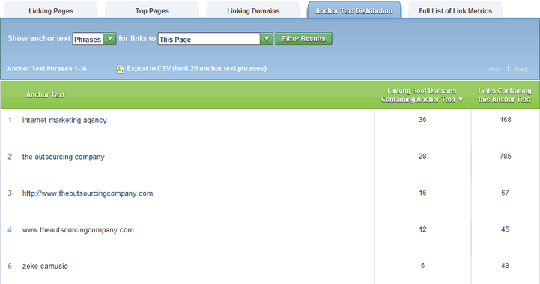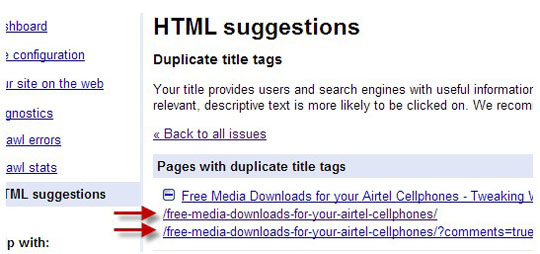Doing SEO without competitive analysis is like driving to a place you’ve never been, without a map, GPS, or any clue how to get from point A to point B. It’s not a smart thing to do and will leave you lost. I’ll show you how to analyze your website (and other factors) to uncover what you’ll need to do to rank #1 on Google.
Number of Incoming Links
Why It Matters: You want a lot of great incoming links.
How to Check this Metric: You can use the SEOQuake Firefox add-on to see how many incoming links you and your top 10 competitors have.
![]()
What to Do About This: If you don’t have as many links as your competitors, you should work on getting more.
Quality of Incoming Links
Why It Matters: The number of incoming links is important, but the quality of those links is even more important. You want your incoming links from high-quality sites and websites that are related to your site.
How to Check this Metric: Use Open Site Explorer to find out who’s linking to you and who’s linking to your top 10 competitors.

What to Do About This: If your link profile isn’t as good as your competition (i.e. Your links come from free directories, link farms, and other low-quality link sources; their links are earned based on merit and come from quality sites.), study your competition and emulate the good things they do.
Anchor Text
Why It Matters: When you’re trying to rank for “exercise equipment” a link such as “check out our exercise equipment” is much more valuable than one like “for exercise equipment click here“. You want your keywords in the anchor text of your links.
How to Check this Metric: Use Open Site Explorer for this as well.

What to Do About This: If most of your incoming links don’t contain your keywords, start a link building campaign and get keyword-rich text links. Also, don’t forget that internal links are very important too. You have full control over your internally linked pages within your site, so use your keywords.
Number of Indexed Pages

Why It Matters: You want search engines to index as many pages of your site as possible.
How to Check this Metric: Use SEOQuake again to learn how many of your pages Google has indexed. Then compare your results against the top 10 sites Google ranked for the keyword you’re going after.
![]()
What to Do About This: If you find that your top 10 competitors have a lot more indexed pages than you, you should create more pages with optimized content. They could be articles, blog posts, resources or anything else your visitors want.
AllInAnchor
Why It Matters: You need to know if the anchor text of your incoming links are optimized for your keywords.
How to Check this Metric: Use NicheWatch. Here’s a blog post I wrote on how to use NicheWatch.

What to Do About This: If your AllInAnchor ranking for a given keyword is lower than your
regular ranking for that keyword, you need to work on getting links with your keyword as the anchor text.
AllInTitle
Why It Matters: You need to know if your page titles are optimized enough.
How to Check this Metric: Again, use NicheWatch.
What to Do About This: If your AllInTitle ranking for a given keyword is lower than your regular ranking for that keyword, you need to optimize your page title and add your keyword to it.
AllInText
Why It Matters: You need to know if your page content is optimized enough.
How to Check this Metric: You guessed it; use NicheWatch.
What to Do About This: If your AllInText ranking for a given keyword is lower than your regular ranking for that keyword, you need to optimize your page content and add your keyword to it.
Site Age
Why It Matters: The older your site, the better your chances are for ranking at the top; especially on Google.
How to Check this Metric: Use the SEOQuake bar to check your age and the age of your top 10 competitors.
![]()
What to Do About This: You could buy an older site but there’s nothing you can change about how old your site is. But even though you can’t do anything about it, you should still check this metric, because if the top 10 sites on Google are 15 years old and yours is one year old, you know that you’ll have to work extra hard in other areas of SEO to make up for being so “young”.
On-Site Optimization Score
Why It Matters: One of the best ways to rank high is to take a look at the 10 websites that rank at the top, find what these sites have in common and copy what they’re doing.
How to Check this Metric: Although this can be done manually, it’s a lot more effective to use a tool. Internet Business Promoter (IBP) is my favorite.
![]()
What to Do About This: Run the Top 10 Report on IBP. The software will give you an on-page optimization score and will tell you what you need to do to improve it.
Website Architecture Issues
Why It Matters: If your website isn’t designed right, search engines won’t be able to spider it.
How to Check this Metric: Use SEO Browser to see your website the way search engines see it. Make sure they can spider it and follow your links.

What to Do About This: Fix any website architecture issues that you find.
Keyword Cannibalization
Why It Matters: If you have several pages on your site competing for the same keywords, it can hurt your rankings.
How to Check this Metric: Do this Google search: site:yoursite.com “keyword”
![]()
Google will show you what pages of your website are the most relevant for a given keyword and sort them in order of relevance.
What to Do About This: If you have several pages that are optimized for a keyword, pick one and from all the other pages link to that one page using your keyword in the anchor text. Here’s a great article on keyword cannibalization.
Duplicate Content
Why It Matters: Internal duplicate content can kill your rankings. You need to detect it and eliminate it.
How to Check this Metric: Use Google Webmaster Tools.

What to Do About This: Write unique title, meta keyword tags, and meta descriptions for each of your pages.
Check out the SEO Tools guide at Search Engine Journal.
SEO Competitive Analysis: Your Roadmap to Ranking #1 On Google




